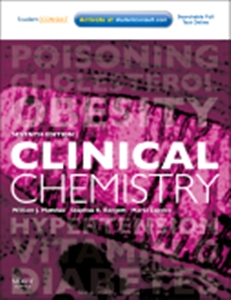Clinical Chemistry,7/e
Clinical Chemistry considers what happens to the body’s chemistry when affected by disease. Each chapter covers the
relevant basic science and effectively applies this to clinical practice. It includes discussion on diagnostic
techniques and patient management and makes regular use of case histories to emphasise clinical relevance, summarise
chapter key points and to provide a useful starting point for examination revision.
The clear and engaging writing style appreciated by generations of readers has been retained in this new seventh
edition, while the content has been thoroughly updated throughout. The approach and scope of this trusted text makes it
ideal for integrated medical curricula for medical training and for students and practitioners of clinical and
biomedical science. The complementary online version of the book, including additional self-assessment material,
completes this superb learning package.
Biochemical tests in clinical medicine. Water, sodium and potassium. Hydrogen ion homoeostasis and blood gases. The
kidneys. The liver. The gastrointestinal tract. The hypothalamus and pituitary gland. The adrenal glands. The thyroid
gland. The gonads. Disorders of carbohydrate metabolism. Calcium phosphate and magnesium. Palsma protein and enzymes.
Lipids, lipoproteins and cardiovascular disease. The locomotor and nervous systemns. Inherited meatbolic disease.
Disorders of haemoproteins, porthyrins and iron. Metabolic aspects of malignant disease. Therapeutic drug monitoring
and chemical aspects of toxicology. Clinical nutrition. Clinical chemistry at the extremes of age.


